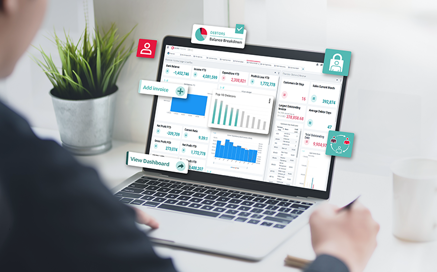
What is a financial management system?
A financial management system is a technology solution for businesses that helps to track, process and manage the entire financial life cycle from invoices and payments to tax management and reporting. If you think about ‘what is a financial management system’, then our financial management systems and accounting software covers the range of tasks that are included.
If you're still not sure what accounting software is, this article will help. It explains what accounting software is in more depth, examples of accounting systems and why it's important for your business.
 6 minutes
6 minutes
Written by James Ramage, Finance technology expert
Financial management system definition
A financial management system (FMS) is a comprehensive software solution designed to streamline and optimise various financial processes within an organisation. It encompasses modules that cover core financial functions such as general ledger, accounts payable, accounts receivable, budgeting, and reporting.
What is the primary goal of a financial management system?
The primary goal of an FMS is to provide businesses with the tools and insights needed for effective financial planning, management, and decision-making.
In the past, accounts teams used to be entirely paper dependent, then thankfully things improved with the advent of spreadsheets. Since then, we have seen a multitude of time-saving, accuracy-boosting advantages from the development of various different accounting software packages. The best options are usually all-round solutions which remove much of the laborious manual intervention and substantially reduce the risk of error. Financial management solutions significantly improve productivity too.
The question many ask is ‘How does accounting software work?’. If you’re interested in discovering more about how to use accounting software and gain insight into what some of the features might look like, then take a look at this 2-minute read of how does accounting software work.
Examples of financial management systems
Access Financials
One example is Access Financials. This is a modular solution which can be designed to suit your organisational set-up – so for example you may need group-level accounting, or perhaps a system that can easily support a growth strategy or where multiple projects need to be managed. Access Financials is a proven solution that already supports 1000s of organisations across a wide range of industries such as not for profit, health and social care and professional services.
Accounting Software
Other examples of accounting software are Xero and Sage. Take a look at how Access Financials, Sage and Xero compare.
As part of an ERP System
For even more complex needs, you may also need to consider accounting software within an Enterprise Resource Planning (ERP) system, or commercial accounting software. You will also need to decide whether you are looking for an ‘out of the box’ cloud solution that is ready to use and easy to manage, or a customised and tailored accounting software solution that is designed for your organisation.
Features and capabilities of accounting and financial management software
General Ledger
- Comprehensive tools for managing and tracking financial transactions.
- Chart of accounts, journal entries, and financial reporting.
Accounts Payable
-
Streamlining the process of managing and paying supplier invoices.
-
Purchase order matching, invoice approvals, and payment processing.
Accounts Receivable
- Efficient management of customer invoices and receivables.
- Invoicing, credit management, and cash application.
Cash Management
-
Tools for optimising cash flow and managing liquidity.
-
Bank reconciliations, cash forecasting, and treasury management.
Budgeting and Forecasting
- Planning and forecasting cash flow and financial performance.
- Budget creation, variance analysis, and financial planning.
Fixed Assets
- Tracking and managing the organisation's fixed assets.Asset register, depreciation calculations, and asset disposal.
Purchasing
- Automation of procurement processes and purchase order management.
- Supplier management, requisitions, and purchase order approvals.
Expense Management
- Streamlining the management of employee expenses.
- Expense claims, approvals, and reimbursement processing.
Project Accounting
- Tracking financials related to projects or cost centres.
- Project accounting, budgeting, cost tracking, and profitability analysis.
Reporting and Analytics
- Robust reporting tools for financial analysis and decision-making.
- Customisable financial reports, dashboards, and business intelligence.
Considerations before purchasing a financial management solution
You’ll probably want to look at various accounting package examples before making a decision about what’s right for your organisation. Bear in mind the following key questions:
- How much flexibility and scalability do you need to match your business growth goals?
- How complex is your organisation – do you have multiple businesses within a group for example?
- Do you need to process transactions in multiple currencies?
- Do you want to include the ability to process purchase and sales orders?
- Is it important to incorporate project costing and billing?
- How much automation of finance processes would benefit your business?
With key questions like these (and more) in mind, it will be easier to focus on the accounting package most likely to meet your current and future requirements.
Why is a financial management system important?
The most important reason to switch to an up-to-date accounting software solution is the huge range of benefits it delivers. If you believe your business has outgrown its current accounting software package, or that the Finance function could operate more efficiently, then it’s probably time to change to a full-service, cloud-based accounting software solution.
Core benefits of accounting and financial management solutions
Accounting software goes beyond basic bookkeeping, offering a range of tools and processes to govern an organisation's income, expenses, and assets. The primary objective is not only to maintain daily business operations but also to maximise profits while safeguarding financial data from potential fraud and theft.
- Streamline your finance-oriented processes and improve the overall efficiency of your Finance team, and the interactions they have with the rest of the business.
- Improve accuracy by introducing more automation and reducing or eliminating the need for rekeying data.
- Save time by giving your Finance team the tools they need to get things done quickly and effectively.
- With a range of insightful and accurate reports on hand at the click of mouse, its much easier to see the bigger picture and make confident business decisions quickly.
- Setting up alerts for key elements such as late payments or discrepancies enables your team to identify issues and respond quickly before they become a problem.
- Modern accounting software has functionality built-in that is designed to help you meet legal requirements such as GDPR much more easily.
- A joined-up approach to running your Finance function makes it much easier to deal with auditing or investigations if the need arises.
Get accounting software for your business
Now you know what accounting software is and the examples and benefits, you may be considering which package is right for your organisation.
Our accounting software specialists are on hand to discuss your requirements and walk you through our software to see if it's the right fit for you. Book a demo today.
Alternatively, if you're not ready to book a demo. You can download our brochure to find out more about our accounting software.
Want to know more?
Have a read through more accounting software information, guidance and advice.






